
Acceptance
The man’s body was already on the side of the Dartmouth ferry slip when Sergeant Pam Giles arrived.
He had been missing for days after taking a moored-up boat in bad weather to cross the water, leaving the pub too late to get the last ferry.
While her male Police Constable colleague rushed off to be sick, stricken at the sight of a man who had been in the water for several days, Sgt Giles calmly opened the boot of the patrol car, pulled out some rolled-up traffic signs to shield the corpse and checked his pockets for identification.
Although she had been on the job for many years, moving up through the ranks, dealing with the dead body was a defining moment where the woman Sergeant was accepted by the community.
Pam, now retired after 30 years’ service, said: “I remember the harbour master saying to me ‘that’s the best thing that could have happened to you maid, now we know you can do the job’.”
It was almost a decade since Pam joined the Police. Now, as one of two Sergeants based at Dartmouth, dealing with the dead body was how she earned her stripes in the face of the town.
‘We accepted you as our Sergeant when you pulled the body out of the river. If a woman could do that, she could be our Sergeant…’”
The man pulled from the harbour had been spotted by a passing fishing boat, whose crew took the body onboard, returning it to shore.
When Sgt Giles checked the body for any possessions to confirm his identity, live crabs crawled from his clothes.
“In his pockets he still had a couple of cans of beer. The crabs were coming out of his clothing. It wasn’t very pleasant, and one of the Police Constables with me ran off spewing,” said Pam.
“In those days we carried accident signs in the cars. They were rolled up plastic. We used those to give him a bit of respect, to cover him up a bit.
“The chap had gone missing for a number of days. He had gone on a boat to cross the river.
“If the ferry had stopped, people used to hitch a rowing boat to go across when they missed the ferry. This chap had done that. It was bad weather. He was lost and about a few days later he turned up. He was landed at the higher ferry slip and so I went down there.
“It was maybe a week or more when I saw the harbour master. He told me everyone was very impressed with the way I dealt with it, because I was a woman.
“That did it for me. From then on, they called me Sergeant Pam. It became personal. “And I got invited to the harbour master’s house on New Year’s Eve to play cards.”
Pam added: “It was while I was playing my first ever game of poker with several town officials when I was told ‘we accepted you as our Sergeant when you pulled the body out of the river. If a woman could do that, she could be our Sergeant.’”
“From them I was affectionately known as Sergeant Pam by the townspeople.”
1970s – Women Police Segregation
From her first day on the beat with Plymouth City Police in 1975, Pam saw the difference in the way women were viewed in the force.
She said: “There was a lot of resentment. They didn’t want women on the section. It was the old-fashioned attitude ‘we don’t want women here’.
After two years as a Special Constable, Pam left her teaching job to become a Woman Police Constable (WPC).
She said the inequality she experienced was a ‘shock’, compared to serving as a Special Constable, where male colleagues treated her as an equal.
“When I finished training school I went straight to a Policewomen Department. I thought ‘what’s all this?’ Everyone in the department was woman; the Sergeant, Inspector, Chief Inspector…”
“Initially I didn’t know there was a difference because I had been in a department of rural community police, where I worked all the time with the policemen in the police station. I was never conscious of any difference,” said Pam. “And I went to training school with men and women.”
“When I finished training school I went straight to a Policewomen Department. I thought ‘what’s all this?’ Everyone in the department was woman; the Sergeant, Inspector, Chief Inspector.”
“In the Policewomen’s department I was told we only dealt with shoplifting, thefts from shops, missing persons, sex offences and women. That was it. I was really shocked and thought ‘what’s going on?
“The recruitment adverts never mentioned separate departments for women. I only reported to the women Sergeant or woman Inspector.
“In the Specials I was never separated out or treated any differently from the men. I’d never heard of a Policewoman’s department.”
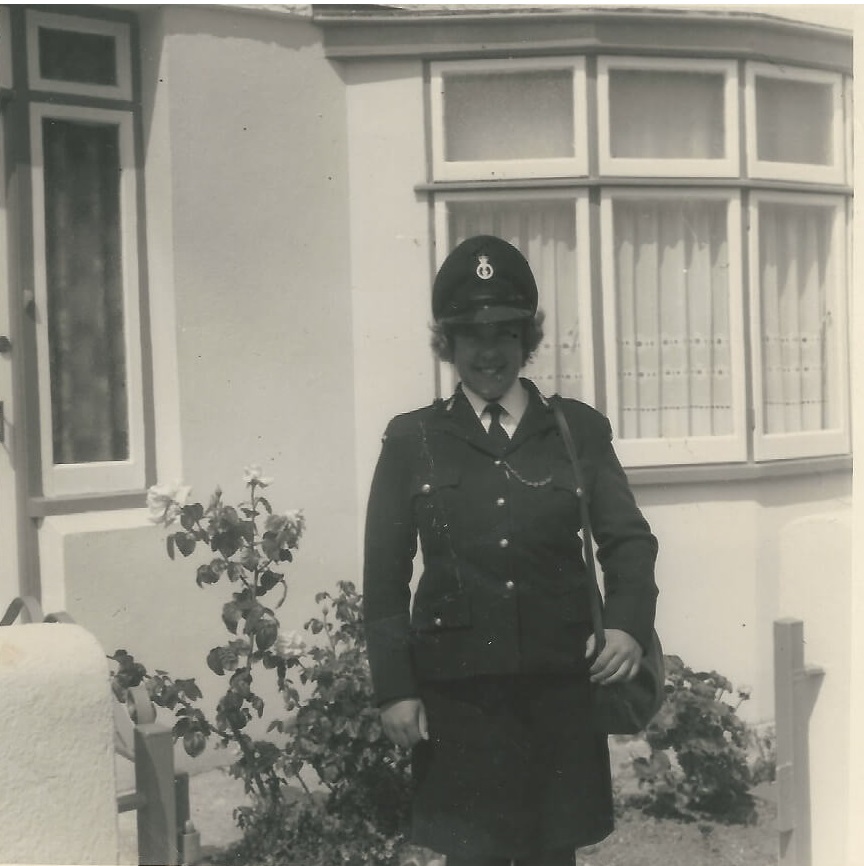
The British Association of Women Policing reports that occupational segregation was legal up until the mid-70s. Female officers had a separate rank structure within their own departments and were ‘often’ located away in a separate part of the building.
Within their own offices, they had their own changing rooms and would carry out ‘a segregated set of tasks’.
From January 1976, after the Sex Discrimination Act was passed, segregation stopped, and women police ‘ceased to exist’. They were merged into the general system and the ‘discriminatory prefix’ WPC was scrapped, said the British Association of Women Policing. However, Devon and Cornwall Constabulary failed to scrap the WPC title until many years later, in the late 1980s.
Pam said women resigned in droves amid the merger ‘for fear of what was to come’. She said most had only worked in their own department, and usually not beyond 11pm.
“Those of us that had just returned from training school expected to go out on foot patrol. We expected to deal with traffic law and expected to work shifts with the men.
“Not only were the existing policewomen doubtful as to what was going on, but a large proportion of the men didn’t want women joining their sections.
“Policewomen with a number of years’ service either disappeared into various hidden departments or left the job completely.”
Those who remained were shoehorned into different sections of the force.
“There was a token woman in each department,” said Pam. “The attitude from some senior officers within the Devon and Cornwall Constabulary was ‘we have got our policewoman so that’s it’. You couldn’t be a dog handler. You couldn’t be in CID.”
WPC Uniform
When Pam joined the force her Devon and Cornwall Constabulary police-issued uniform consisted of a skirt, stockings, cape, and a soft hat. She carried a handbag, complete with a mini truncheon that was small enough to fit neatly inside.
Pam said the only clothing that kept her dry when on patrol in the rain was a heavy wool cape.
“It was a brilliant bit of kit,” Pam said. “The raincoats got sodden. You just got wetter and wetter because the rain went through in the end.”
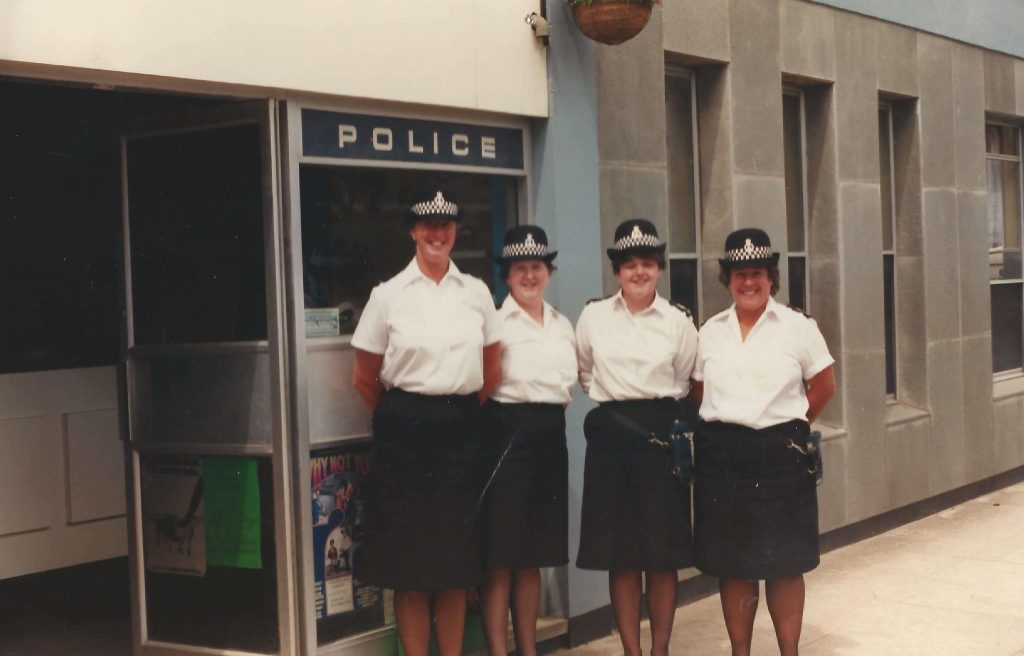
Photo: MOPIDAC/Pam Giles.
Women wearing trousers on the job was decades away. They were banned by the force until the early 1990s.
“We were expected to get on the floor and check somebody’s exhaust and they put us in stockings and a skirt; we had mini truncheons for our handbags. When I look back, it’s ridiculous,” said Pam.
“There were no protective helmets for women, not until they brought in the bowler hat. Before that it was white, soft, hats.”
Probation – Plymouth City Police
After the policewomen departments were disbanded, Pam was integrated into “D” section Plymouth Central Police Station where she saw out her probation.
That was when I started doing real police work, foot patrol,” she said.
Pam found the environment difficult. Plymouth officers continued acting as though it was still a city force. Even though amalgamation had taken place almost 10 years before, many still wore city badges on their helmets instead of the Devon and Cornwall Constabulary helmet plate.
Her first beat on night duty, in 1976, probationer Pam ‘walked and walked and walked’ with a Police Constable whose aim was to put her off the job.
Unknown to the officer, Pam had spent the previous three years as a PE and outdoor pursuits teacher, hiking in Scotland, Wales, the Lake District and Dartmoor.
“We were expected to get on the floor and check somebody’s exhaust and they put us in stockings and a skirt; we had mini truncheons for our handbags…”
“His plan backfired on him,” said Pam. “It was his intention to walk me off my feet, so we walked, and walked, and walked. Never did we look at a door, let alone shake its handle. Nor did we stop and speak to anyone or check any shelters, vehicles or buildings for persons sleeping rough or trying to break in. We just walked.
“I wasn’t about to give up on my ambition to be policewoman. Slowly he realised this and, being old school, knew his beat craft so I was fortunate to be tutored by him. But oh, that first night.”
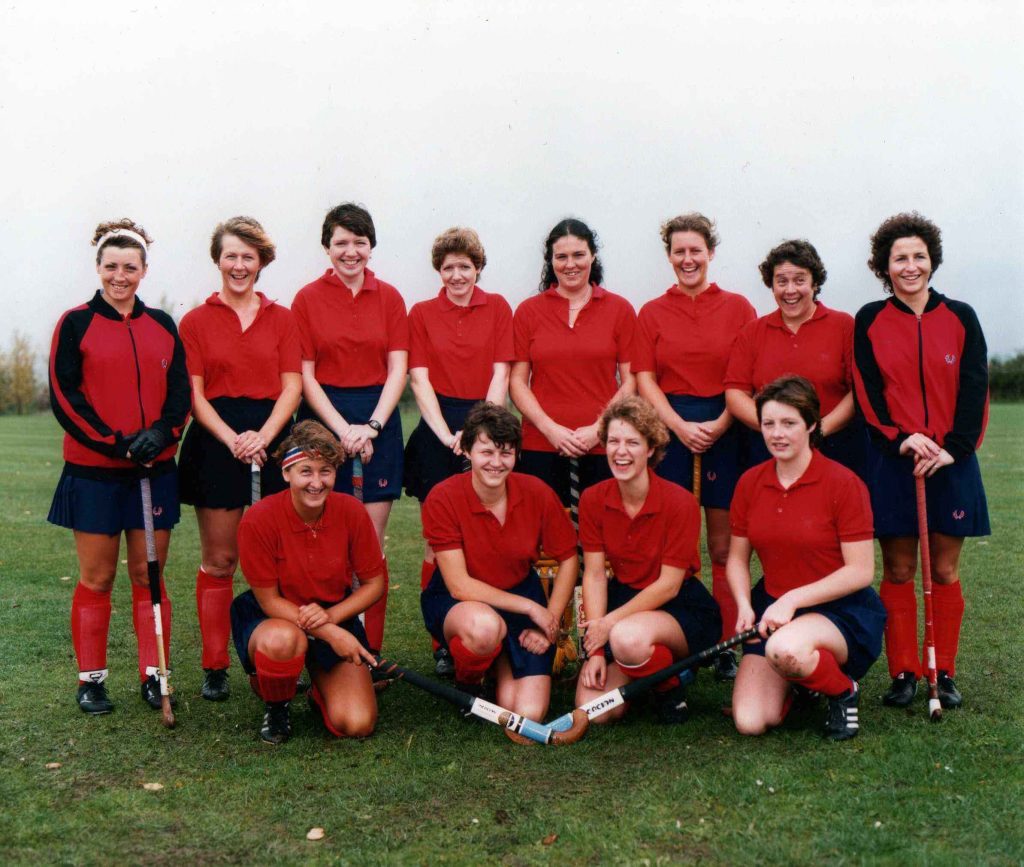
Photo: MOPIDAC/D&C Police.
Pam had been trained for foot patrol, dealing with traffic law, road traffic accidents, persons taken ill in the street, aircraft crashes, life-saving skills, and criminal law.
But she was not immune from being sidelined into mundane jobs, such as filing during high-profile investigations.
It was during a murder investigation when ‘rookie’ WPC Giles was sent to Greenbank police station; her part in the major investigation was filing the admin and paperwork.
“I thought ‘I shall be going back to teaching, this is just driving me nuts’”, said Pam. “When I was a Special Constable, I had booked people, given out tickets, and done community policing. That’s all I wanted to do.
“I had a few weeks in the new police department, then I went to Greenbank filing all day long, I wondered what had happened.
“You may say that was a rookie’s job, to file papers, but I never saw any of the new policemen doing it.
“I was so bored. For something to do I wrote a cookery file which I still use to this day.”
She added: “Another job given to the rookie women on that enquiry was to walk down to The Embankment in Plymouth and get the investigating officers sandwiches and pasties, putting them in our handbags under our capes.”
Buckfastleigh – first Devon and Cornwall Constabulary female motorcyclist
When probation ended, Pam applied to work in Buckfastleigh, where she was to live in a police house. It was classed as a police station, with an office and rigid set of handcuffs.
“I knew from my Specials’ work that I really wanted to work in the country and get involved with the community and people,” said Pam.
Shortly before transferring, Pam was asked if she could ride a motorbike and was put through training.
She became the first resident female motorcyclist in Devon and Cornwall Constabulary. Her policeman-issued kit was altered to fit; a man-size helmet had the visor cut shorter.
“I wore walking boots to ride it to start with because I couldn’t get any motorcycle boots to fit me,” she said. “They cut down a pair of men’s boots for me.
“They gave me a pair of trousers. That was the first trousers I had. They were men’s trousers and the tailor had to take them in and up. They didn’t have any female trousers then.”
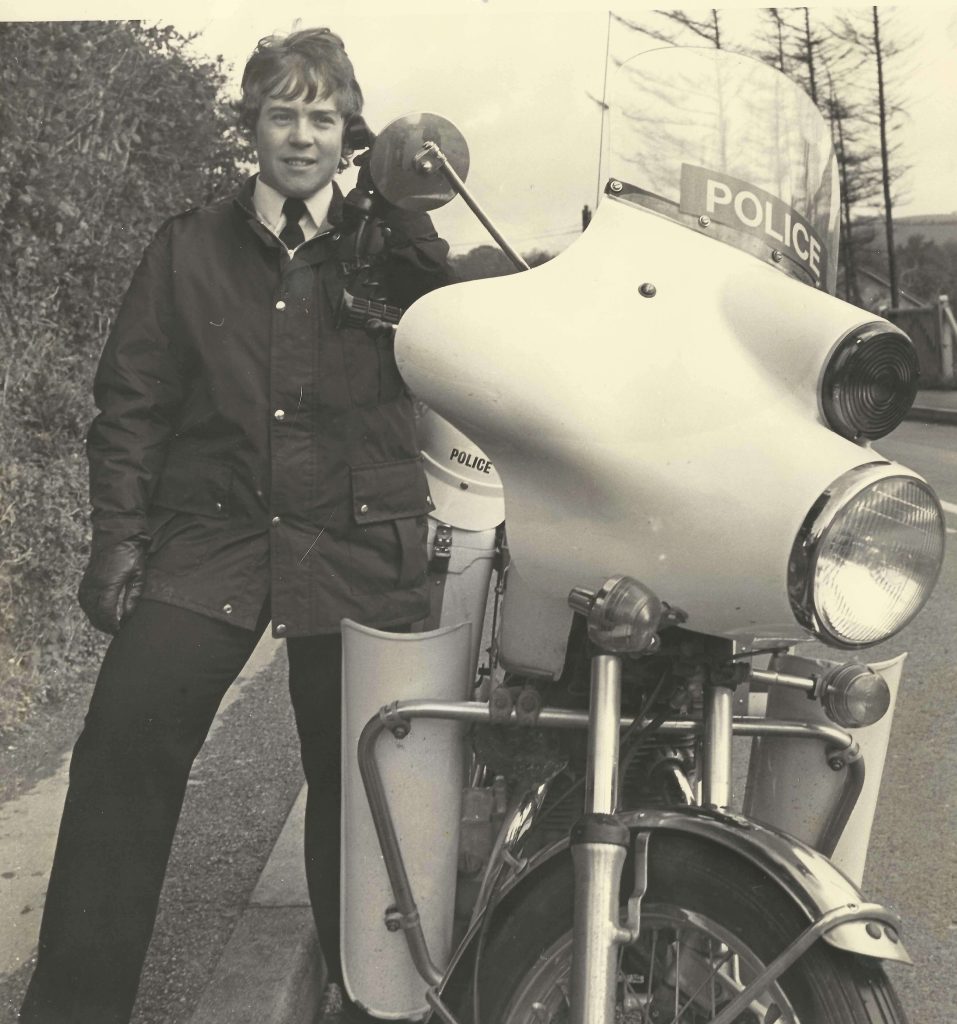
Photo: Devon News Exeter.
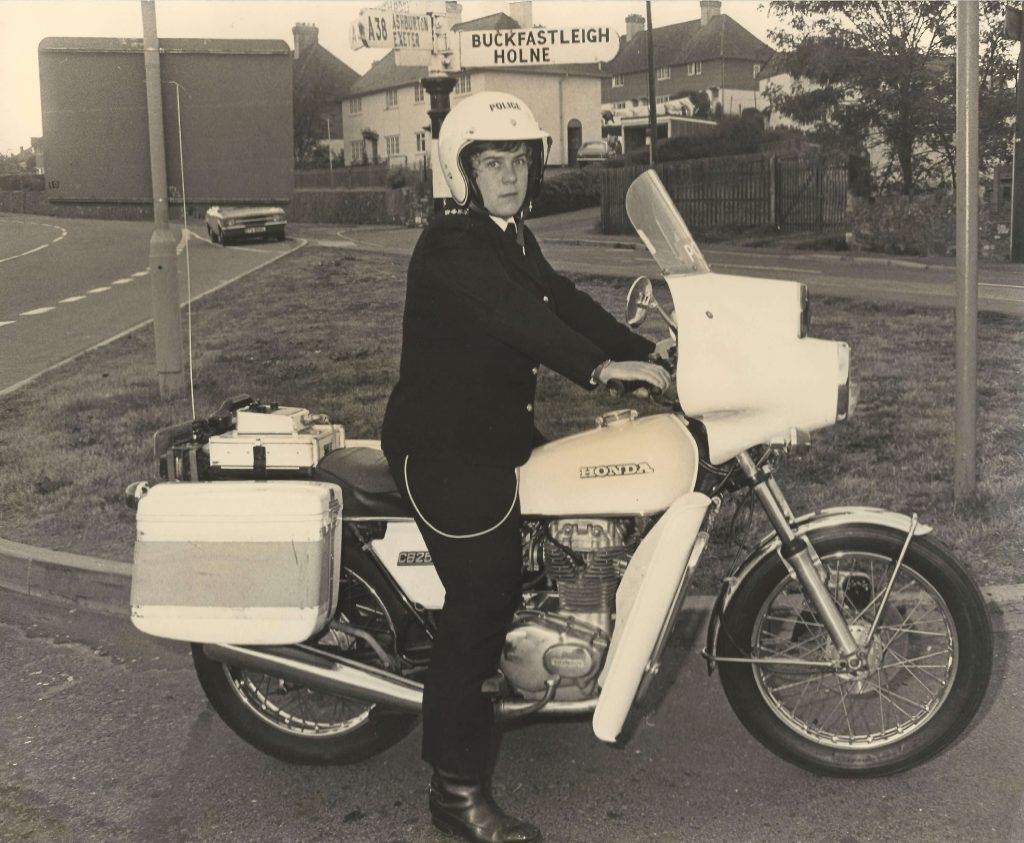
Photo: with permission.
Pam said: “Despite running the police house, riding the bike and completing all the duties of a resident officer there were still some male officers who resented my position. They didn’t want a woman.
“One Widecombe fair day my motorcycle, which was always used to patrol the roads around the fair, was allocated to a male officer and I was put on foot patrol at the fair.
“When I queried it, I was told a female officer was needed to be available for lost children.”
Detective Constable, Exeter CID
Immersing herself in the community at Buckfastleigh soon paid off. Residents began putting tip-off notes about crimes through the police station letter box.
“Following my high detection rates at Buckfastleigh I was encouraged to complete a CID aide and afterwards I was posted to Exeter.
“I was told it was a large department and they had agreed to have a second woman on the team.
“In the early days this was the story. There were vacancies on various departments but not for women.
“It was normal to hear comments like ‘we don’t have women on firearms, we don’t have women as Police Support Officers, we only have one female.’”
1983 – Discrimination at its worst
When Pam was posted to another part of Devon she suffered sexual discrimination by a male supervisor. She said: “Everywhere you went you would have to prove yourself, but this was the worst. He wanted to get rid of me because I was a woman.
“I showed him around the town and when he found his feet, he started. The other men on the section protected me.
“That was the nearest I got to being upset by it. Other than that, I took it in my stride.”
Pam said: “The word bullying didn’t exist then. He’d been there two weeks when it started.”
‘I don’t have women driving cars. I don’t like women on the job. I’ll have your resignation before the end of the month…”
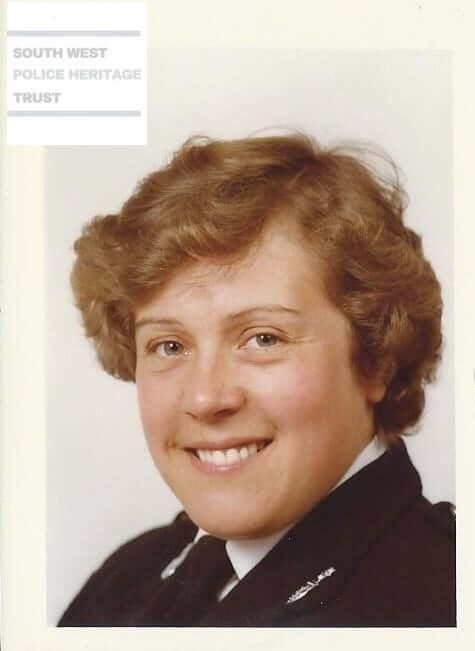
The male colleague threatened to cancel her leave in lieu and planned holiday abroad, goading ‘there’s nothing you can do about it’; he ordered her to wear different shoes to work because her Blakey’s were ‘too noisy’.
He sent her out on permanent foot patrol, telling Pam ‘I don’t have women driving cars’, warning her ‘I don’t like women on the job. I’ll have your resignation before the end of the month.”
But it was when headquarters cancelled foot patrol amid severe winter conditions, Pam felt the full force of the man’s bigotry.
“No one was to go on foot patrol and all officers were to report to their nearest station to work,” said Pam.
“He sent me out in a blizzard on foot patrol carrying a breath test machine in case I saw any cars.
“Fortunately for me, my section was very loyal and with their help I stayed one step ahead of him. I spent the night in an old people’s home watching telly and snuggled up in a warm lounge.
“One of my colleague’s wives worked there on nights. My colleagues kept phoning me on the landline and updating me.”
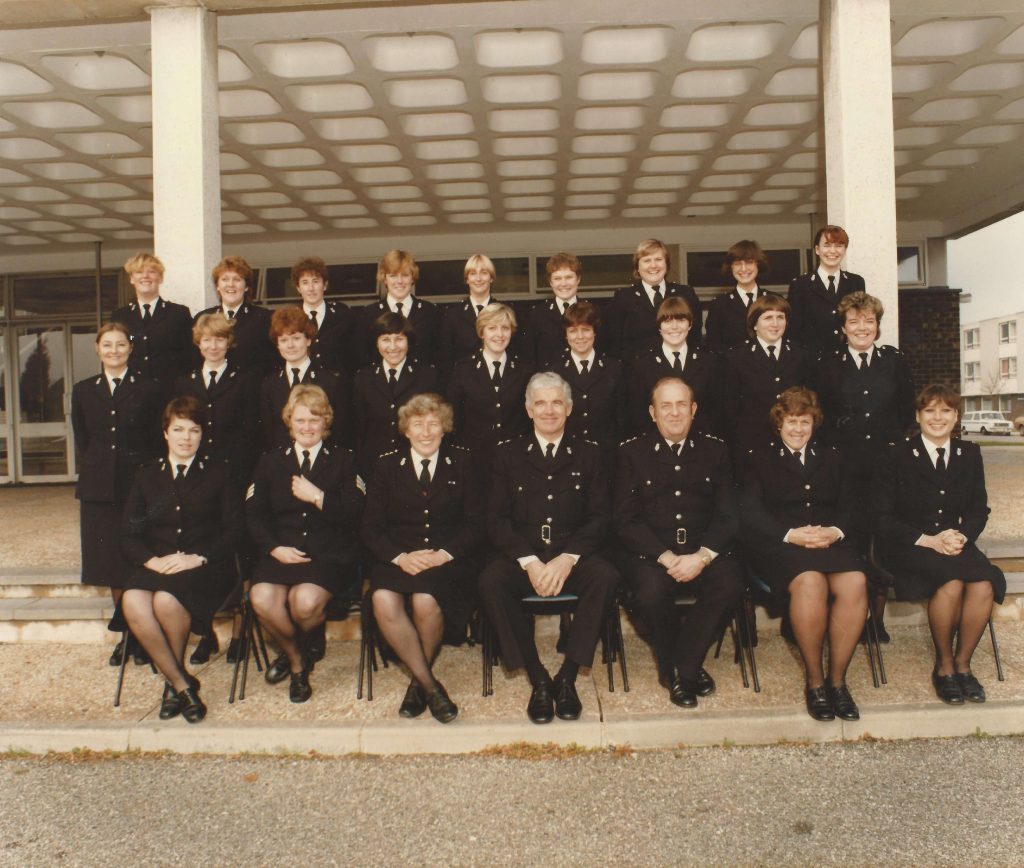
Photo: MOPIDAC.
At one point the man went out in the blizzard to look for senior Police Constable Pam.
“I walked back into the station for meal break, handed the breath test machine in, and told him my radio wasn’t working could I have another before I went out again,” said Pam.
“In those days you didn’t question a higher ranked officer and you knew that if you complained you would come off worse. I just coped with it for as long as I could.
“I consider I am a strong character, but in the end even I suffered. Fortunately, I was friendly with a couple of high-ranking officers and confided in them.”
“The matter resolved itself when I was transferred on promotion shortly afterwards.
She added: “I suppose these days it would be bullying in the workplace and there would be avenues of action to take, but back then it was plain sex discrimination or male chauvinism.
“You either dealt with it or as in some cases, you left the job.”
1998 – 2003 – Changing times
Towards the end of her 30-year service, Pam served in Torquay as a Custody Sergeant, then moved to Newton Abbot to run the Teignbridge Special Operations Group.
In the late 1990s until the early 2000s, she was District Inspector at Paignton, and in Torquay.
Pam said: “Times were changing slowly and there were gradually more women in the traffic department, drugs units, and even one dog handler.
“Finally, in the early 90s, we started to be issued with proper, specifically designed, female clothing and trousers.
“And the Police Federation was fighting hard for protective clothing for us, including hats.”
“I experienced sex discrimination from colleagues, and from the public, but I dealt with it all in my own way…”
Pam retired from the force in 2003, ending a 30-year police career. She saw out her last 10 months as Chudleigh Patrol Inspector.
She said: “I had a fantastic working life and enjoyed almost every minute of my police service. There were highs, and lows, and I never did the same thing two days running.
“I experienced sex discrimination from colleagues, and from the public, but I dealt with it all in my own way. Either by confronting them, sorting it, or by proving practically that I could do the job. Most of the time I found this did the trick.
“As I got promoted, I made sure that the men I worked with realised I was part of their team. I would do the job with them, but I was responsible and would support them so long as I knew what was going on. They learned, as their boss, I actually cared about them.
“But I must emphasise what I have shared from my time in the job is my personal experience.
“Another person may have seen it all differently.”
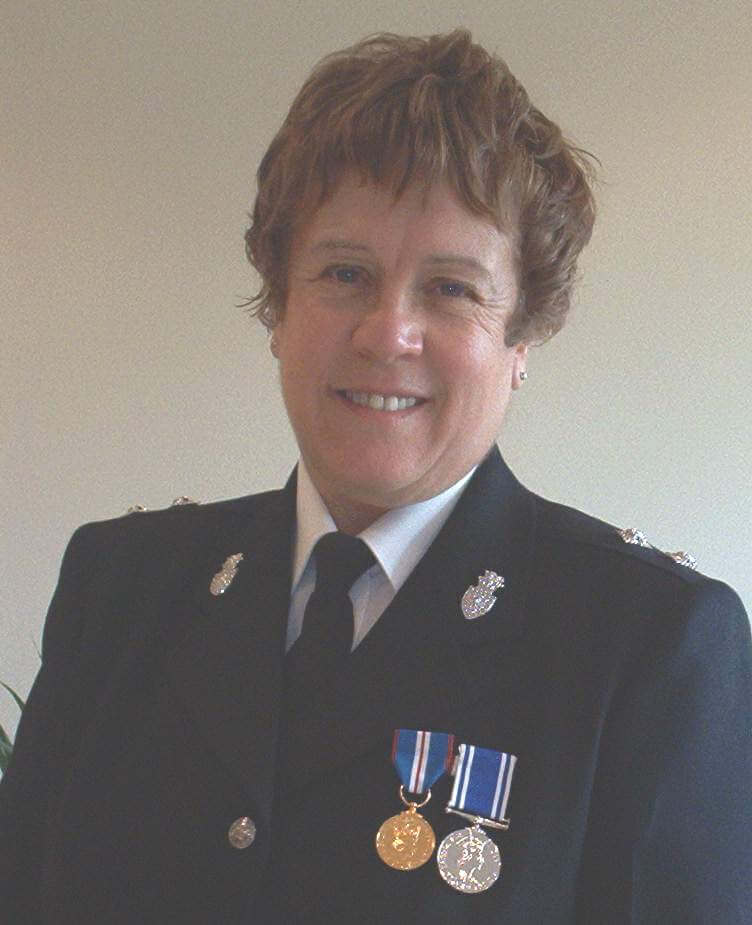
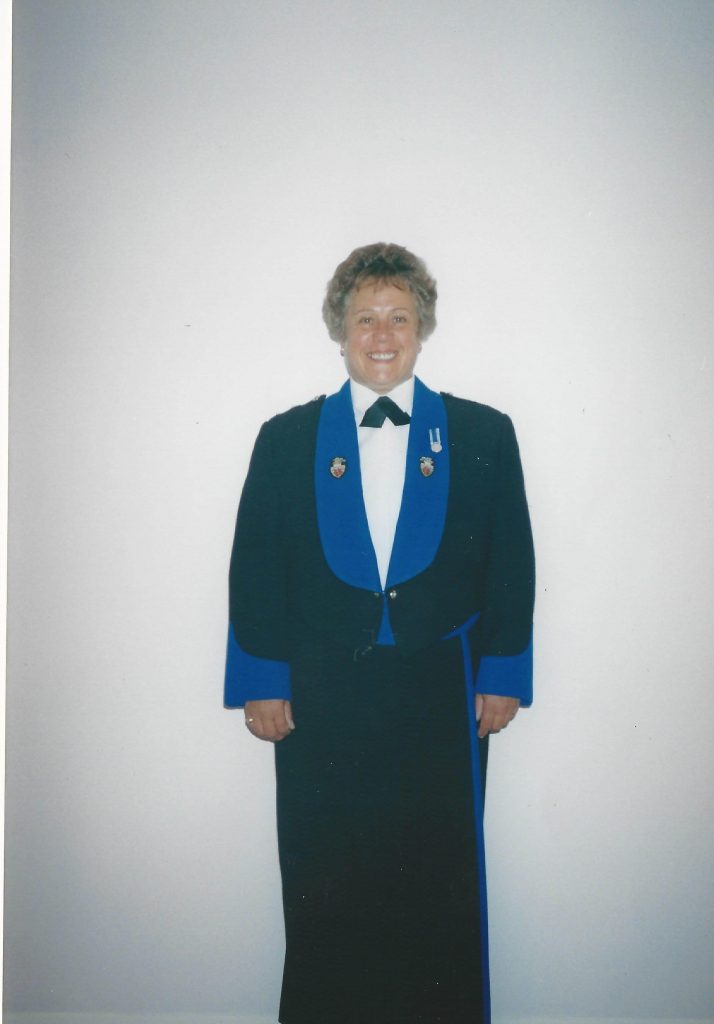
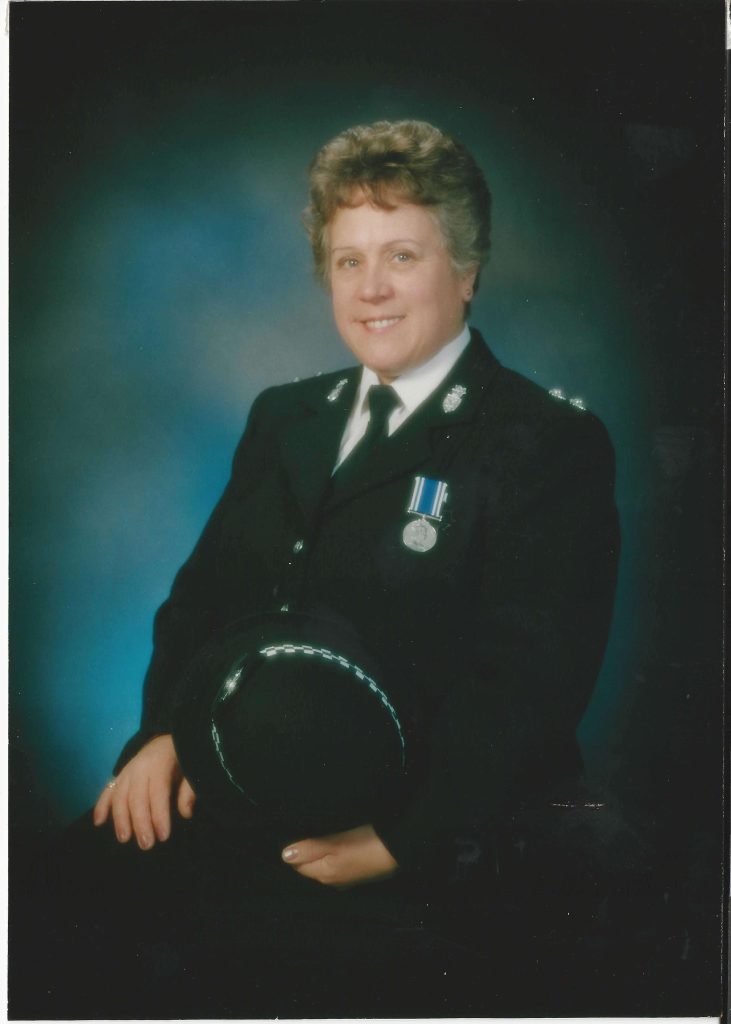
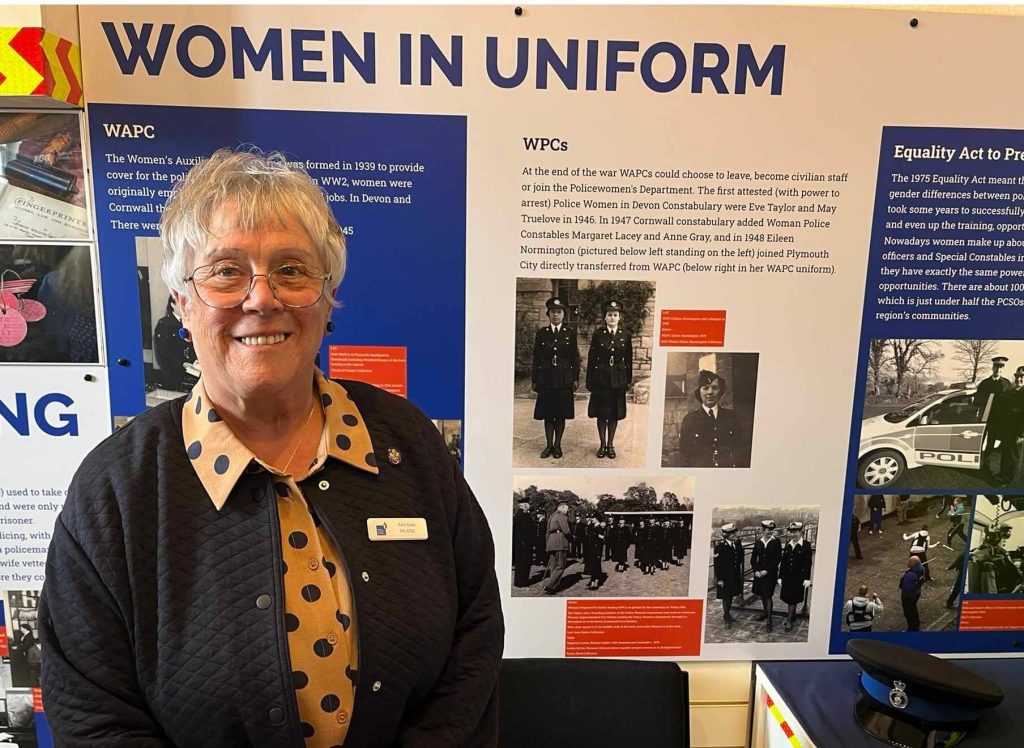
Photo: MOPIDAC.
Pam’s career in brief:
• Plymouth as a probationer before becoming a
• Resident Police Motorcyclist at Buckfastleigh
• CID aide at Totnes
• Detective Constable, Exeter CID
• July 1981. Middlemoor as Cadet Training Officer
• April 1983. Acting Sergeant
• March 1985. Promoted to Sergeant or Chief Constable of Dartmouth with 10 staff.
• Torquay Custody Sergeant
• Newton Abbot Patrol Sergeant
• Teignbridge Special Operations Group Sergeant
• August 1995. On promotion to Inspector to the Force Control Duty Officer
• Feb 1998. Divisional Operations, Torquay
• April 1999. Paignton District Inspector
• 2001. District Inspector, Torquay
• Feb 2003. Chudleigh Patrol Inspector
• Retirement


